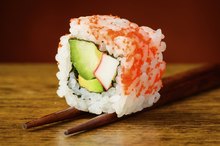Nutritional Facts of David Sunflower Seeds
As a member of the ConAgra Foods company, David Seeds has been roasting and selling sunflower seeds since 1926. The company produces multiple flavors of seeds including nacho cheese, barbecue, jalapeno, ranch, dill pickle and chili lime. In addition, David makes a low-sodium version of the seeds to help those with special diet needs. When eaten in moderation, David sunflower seeds can be a good source of healthy fats, fiber and protein.
Calories
A 1/4-cup serving of David sunflower seeds, without the shells, provides 190 calories. There are also 190 calories in 3/4 of a cup of the seeds with the shells. All flavor varieties of David sunflower seeds contain 170 to 190 calories per 1/4-cup serving. This makes up approximately 10 percent of a 2,000 calorie diet.
Fat
Hulled vs. Unhulled Sesame Seeds
Learn More
David sunflower seeds contain 15 g of fat per serving. Twelve of the 15 g come from polyunsaturated and monounsaturated fats, while only 1.5 g come from saturated fats. David sunflower seeds are cholesterol- and trans-fat free. The American Heart Association recommends that a majority of your daily fat intake come from polyunsaturated and monounsaturated fats. It is recommended that polyunsaturated and monounsaturated fats replace saturated fats in the diet to help reduce cholesterol levels and decrease risk of heart disease.
Carbohydrates
David sunflower seeds are a low-carbohydrate food. A serving of David sunflower seeds provides 5 g of carbohydrate. A majority of the carbohydrates in the sunflower seeds come from fiber. A 1/4-cup serving of David sunflower seeds contains 4 g of fiber, which makes up 16 percent of your daily recommended fiber intake. The American Heart Association recommends consuming about 25 g of fiber per day to help reduce cholesterol levels and promote heart health.
Protein
Is Peanut Butter High in Cholesterol?
Learn More
A serving of David sunflower seeds provides 9 g of protein. Protein is needed in every cell in our bodies. It helps to repair old cells and create new ones. The National Institutes of Health states that eating a nutritionally balanced diet generally provides adequate protein to meet daily nutrition needs and that protein supplements are rarely needed by healthy people. Since protein needs vary based on age, sex, and activity level, discuss your protein intake with your doctor to make sure you are meeting your daily needs.
Vitamins and Minerals
David sunflower seeds are a good source of vitamin E, folic acid, magnesium, iron, niacin, phosphorus, zinc and calcium. A serving meets nearly 40 percent of your daily vitamin E needs. Vitamin E is an antioxidant that can help to protect the body tissue from cancer-causing free radicals. The National Institutes of Health recommends that individuals over the age of 14 consume 15 mg of vitamin E each day.
Related Articles
References
Writer Bio
Emily Creasy began writing professionally in 2010. As a registered and licensed dietitian her writing focuses on weight loss, disease-specific diets and diet-friendly cooking. She holds a Bachelor of Science in human nutrition, foods and exercise from Virginia Tech and a Master of Science in dietetics from James Madison University.









